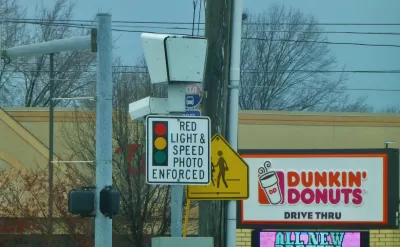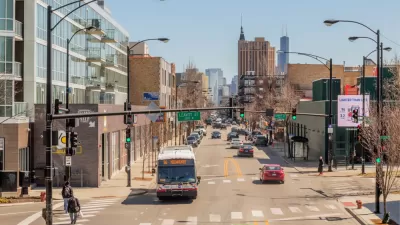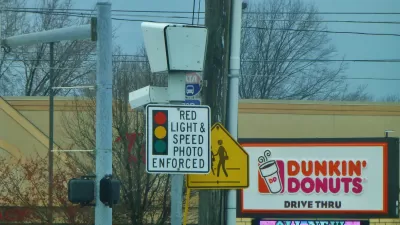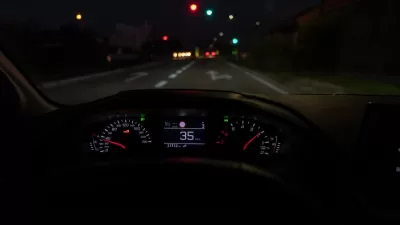A Northwestern University study found that Chicagoans ran fewer red lights after cameras were installed, even at intersections that don't have cameras.

Because of its troubled start, the red light cameras program in Chicago has been the subject of a study from Northwestern University. The study found that cameras do improve safety at intersections with cameras. "In addition to the overall finding that injury crashes dropped by 10 percent thanks to the cams, the study found that while rear-end crashes increased by 14 percent at intersections where cameras were installed, consistent with other cities, the more dangerous T-bone and/or turning crashes decreased by 19 percent," John Greenfield reports for Streetsblog Chicago. The study also found an additional benefit, "a never-before-documented 'spillover effect' that is also resulting in less red light running at intersections that don’t have the cams," Greenfield writes. The authors of the study found that fear of cameras works as a deterrent for drivers who may not know which intersections have cameras.
Shortly after Rahm Emanuel's government installed red light cameras, a massive bribery scheme was uncovered that sent one city official to jail on a ten-year sentence. The program was a big issue in the mayoral campaign for Emanuel’s reelection, with challenger Chuy Garcia vowing to remove the cameras. This study was undertaken, in part, to get an independent perspective on the cameras and gauge their impact on the city.
FULL STORY: Red Light Cams Improve Safety, Have “Spillover Effect” on Other Intersections

Maui's Vacation Rental Debate Turns Ugly
Verbal attacks, misinformation campaigns and fistfights plague a high-stakes debate to convert thousands of vacation rentals into long-term housing.

Planetizen Federal Action Tracker
A weekly monitor of how Trump’s orders and actions are impacting planners and planning in America.

San Francisco Suspends Traffic Calming Amidst Record Deaths
Citing “a challenging fiscal landscape,” the city will cease the program on the heels of 42 traffic deaths, including 24 pedestrians.

Adaptive Reuse Will Create Housing in a Suburban Texas Strip Mall
A developer is reimagining a strip mall property as a mixed-use complex with housing and retail.

Study: Anti-Homelessness Laws Don’t Work
Research shows that punitive measures that criminalized unhoused people don’t help reduce homelessness.

In U.S., Urban Gondolas Face Uphill Battle
Cities in Latin America and Europe have embraced aerial transitways — AKA gondolas — as sustainable, convenient urban transport, especially in tricky geographies. American cities have yet to catch up.
Urban Design for Planners 1: Software Tools
This six-course series explores essential urban design concepts using open source software and equips planners with the tools they need to participate fully in the urban design process.
Planning for Universal Design
Learn the tools for implementing Universal Design in planning regulations.
Heyer Gruel & Associates PA
JM Goldson LLC
Custer County Colorado
City of Camden Redevelopment Agency
City of Astoria
Transportation Research & Education Center (TREC) at Portland State University
Jefferson Parish Government
Camden Redevelopment Agency
City of Claremont





























